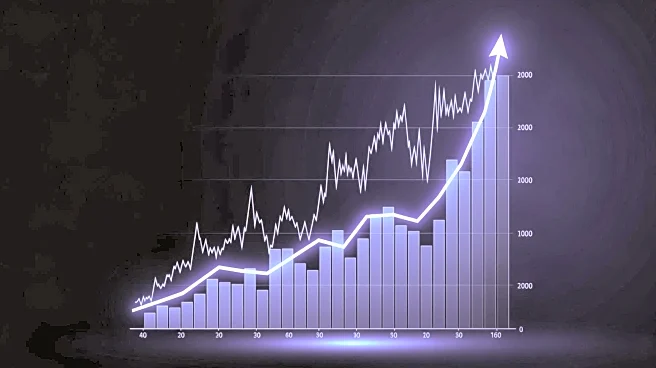What's Happening?
RBC BlueBay Asset Management has successfully capitalized on the 'widow-maker' trade involving Japanese government bonds, which have historically been challenging for investors. This strategy involves
shorting Japanese bonds in anticipation of price declines. Recently, Japanese bonds have experienced significant losses, with a more than 4% drop in total return terms this year, excluding currency fluctuations. This has made them the worst performers among global government bond markets. The market's volatility is attributed to fluctuating interest rate expectations and potential fiscal policy changes under Japan's next prime minister. RBC BlueBay, led by Chief Investment Officer Mark Dowding, has positioned itself for a decline in Japan's 10-year bond prices, maintaining a short duration stance.
Why It's Important?
The success of the 'widow-maker' trade by RBC BlueBay highlights a significant shift in the global bond market landscape. Japan's bond market, traditionally seen as stable due to its ultra-loose monetary policy, is now experiencing increased volatility. This development has implications for global investors, as Japan's bond market influences international debt markets. The strategy's profitability underscores the potential for gains in markets previously considered low-yield. Investors globally may reassess their strategies, considering the impact of Japan's fiscal policies and interest rate changes. The situation also reflects broader concerns about fiscal policy and inflation, affecting bonds from New York to London.
What's Next?
As Japan's bond market continues to experience volatility, investors will closely monitor the country's fiscal policy and interest rate decisions. The potential for a spending increase by Japan's next prime minister could further impact long-term yields. Global investors may adjust their portfolios in response to these developments, seeking opportunities in other markets or doubling down on short positions in Japanese bonds. The ongoing situation may also prompt central banks worldwide to reassess their monetary policies in light of Japan's influence on global debt markets.
Beyond the Headlines
The 'widow-maker' trade's resurgence raises questions about the sustainability of Japan's economic policies and their global impact. The strategy's success may encourage more aggressive investment approaches in traditionally stable markets, potentially increasing market volatility. Additionally, the focus on Japan's fiscal policy highlights the interconnectedness of global economies, where changes in one major market can ripple across others. This situation may also lead to discussions on the ethical implications of profiting from economic instability.










